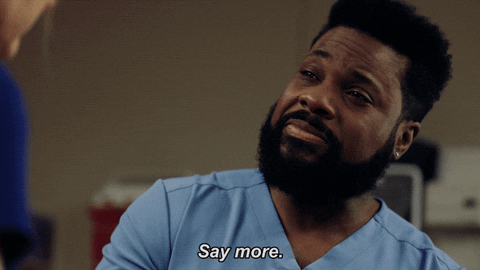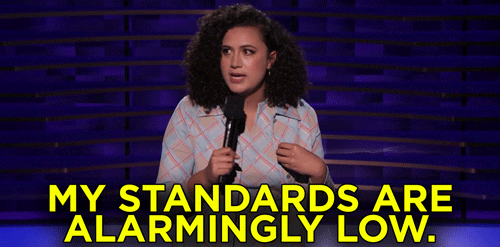I’m 30 and married now, but I remember a friend sending me an article when I found myself in a string of ‘fine’ flings. It was by Mark Manson, and it was on his ‘F*ck Yes or No’ theory.

Essentially he says when it comes to dating, both parties need to share an enthusiastic ‘f*ck yes’ feeling about the relationship. Suppose one or both people are lukewarm, apprehensive, or emotionally unavailable. In that case, it’s a “no,” a “this was fun but no,” ultimately a “get out of romantic purgatory free card...and no.”
I think the article had a lasting impact on me because, in my early 20s, I didn’t know “no” was an option when things were just OK. I confused “settling down” and “settling” in major ways, and it only translated to other areas of life.
Here’s how you can break up and let go of the thing holding you back from incredible love.

Why do we stay in mediocre relationships?
I was having a conversation with a girlfriend not too long ago about the double standards we have for men and women, specifically in heterosexual relationships. We’re conditioned to applaud men or our more masculine counterparts for showing up, while women or the more feminine partner is expected to ‘show out’ or go above and beyond. For example, when a man is taking care of his child, we’re quick to award him with “Dad of the Year.” But when we see a mother juggling and doing her best, we’re quick to point out what she’s not doing or what’s she’s getting “wrong.” Ultimately this conditioning to accept and applaud the bare minimum from men or our masculine partners only proves to be the shackles keeping women in mediocre relationships.

But we also stay in ho-hum relationships for other reasons. It’s our fear and habits toward self-sabotaging that can grip us most. Writer Sasza Lohrey offers, “People stay in mediocre relationships because they know what to expect. There is a lot of comfort in knowing the habits of your partner, even if you wish he/she had different habits.”
Knowing the difference between content and complacent
Every relationship has its plateaus and peaks. So how can we know the difference between needing to spice it up our needing to ship out? It comes down to being content or being complacent.
According to Thriveworks, “Contentment is being satisfied with your life, and it requires accurate self-evaluation and knowledge of reality. Complacent people dismiss and minimize problems, so they do not work consistently to address them. Complacent people may feel a false sense of security and satisfaction, grounded in an inaccurate self-evaluation.”

So, let’s apply that to a relationship. Being content in a relationship means acknowledging what goals you’re working toward and seeing progress in your partnership. It’s you and your partner actively working on communication and feeling more emotionally intimate over time. However, being complacent is not really knowing where things are going or even where you want them to go. It’s the relationship we’ve all seen or been in ourselves, the couple who stay together but no longer have anything in common.
Still not sure if you’re in a relationship worth saving? Consider the following questions:
-
What were the qualities you wanted in a partner before meeting your current significant other? Which of those qualities do they have? Which are they lacking?
-
Have you seen meaningful progress in your relationship over the last year? If so, in what ways?
-
Are you staying with this person out of love or out of fear?
-
Do you believe there is someone or something better out there for you?
-
If you knew then what you know now about your partner, would you go on the first date?
How to let go of a comfortable relationship
If you’ve concluded that a relationship has run its course, it can be hard to let go. Even if we’re longing for excitement and better sex in a relationship, it can be hard to wave goodbye to the familiar cuddles and inside jokes.
Be honest with yourself.
The first step toward letting go is honest with yourself first. Likely you’ve been dancing around the thought of breaking up for some time. But you don’t want to be “the villain who broke up with them before the holidays.” It’s time to turn off the noise and the need for external validation. Sit with yourself and ask the following questions:
-
What has been missing from this relationship that you need? Have you tried communicating your needs to your partner?
-
What were the red flags you missed or chose to ignore?
-
Why did you stay when you felt things weren’t right?
These questions are not to shift blame but rather help you examine the relationship so you can not only learn and grow but articulate why you’re leaving when you break up with the person.
Embark on a journey of soul-care.
Next, it’s time for some intense soul-care. Often we found ourselves in lackluster relationships because subconsciously (or consciously), we didn’t believe we deserved much more. Take time to heal inner wounds and talk with a professional about past trauma. Before you enter your next relationship, you should believe that you’re worthy of incredible love and all the qualities you desire in a partner.
Don’t look back.
The hardest part of leaving is not returning to our old habits. I’ll pick on myself. I had a cycle with an ex because I thought it was easier to deal with him than to be alone. It would take a final breakup — and a trip to a new therapist — before I understood codependency and how much I was holding myself back.
Prepare yourself now. What are your triggers for loneliness and nostalgia? Is it watching reruns of a shared favorite TV show? Perhaps you’re most tempted to call after a night out of drinking. Identify what triggers you to regress (for me, it was tequila shots and The Notebook), and take an intentional breakaway. As we all know by now, self-love can be saying “f*ck no” to the wrong person and the things that make us want them back.








Join the Discussion